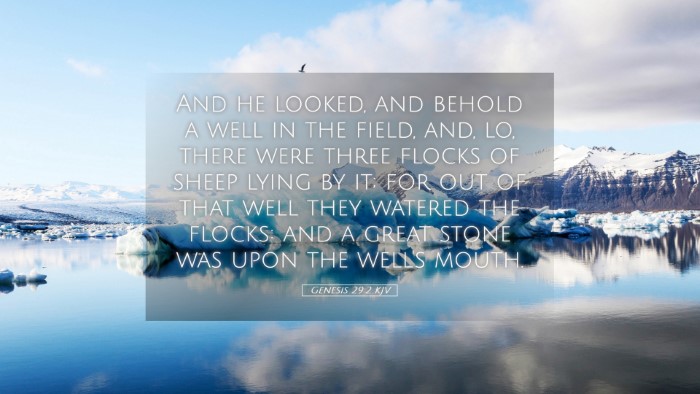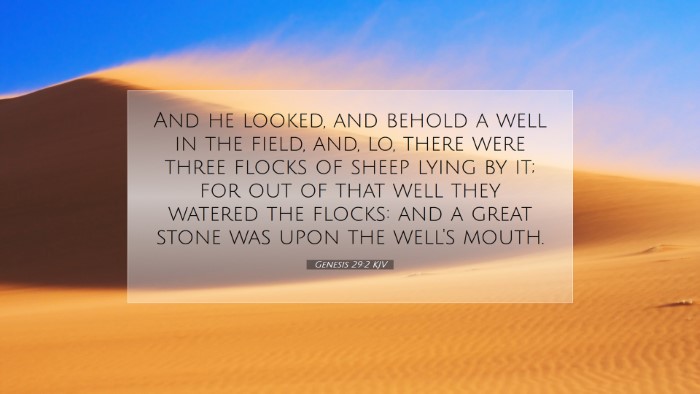Commentary on Genesis 29:2
Verse: "And he looked, and behold a well in the field, and, lo, there were three flocks of sheep lying by it; for out of that well they watered the flocks: and a great stone was upon the well's mouth."
Contextual Overview
Genesis 29 narrates the experiences of Jacob as he travels to Haran to find a wife from his mother's family. This specific verse marks a significant moment in Jacob's journey, illustrating his arrival at a well where the flocks are gathered. Understanding the context of this passage helps the reader grasp the significance of wells in ancient Near Eastern cultures, as they were vital sources of water and often served as meeting places.
Insights from Matthew Henry
Matthew Henry emphasizes the providence of God in the life of Jacob, highlighting how the well symbolizes both sustenance and divine guidance. He mentions that the presence of the three flocks indicates the abundance surrounding the well, which serves as a reminder of God’s provision. Henry notes that it is no coincidence that Jacob arrives at the well when it is filled with sheep, suggesting that God orchestrates events in our lives to lead us to His purposes.
- Divine Timing: Henry posits that Jacob’s timing is providential, arriving when others are there to aid him. This idea illustrates God’s meticulous orchestration of human affairs.
- Symbol of Refreshment: The well often symbolizes spiritual refreshment; just as the flocks are nourished, so too can individuals find refreshment in God’s provision.
Insights from Albert Barnes
Albert Barnes highlights the importance of this encounter in the narrative of Jacob’s story. He points out that the well serves a practical purpose, which was crucial for the pastoral life that Jacob was about to enter. Barnes draws attention to the communal aspect of the well, as it was a place where shepherds gathered, hinting at future relationships that Jacob would form in this new land.
- Well as a Meeting Place: Barnes underscores that the well functions as a gathering spot, symbolizing fellowship and community. This aspect is vital as Jacob is about to form connections that will deeply impact his future.
- Water and Life: Water is a recurrent Biblical theme representing life and sustenance, emphasizing the idea that all life originates from God, and in this scenario, Jacob's journey is spiritually refreshing as well.
Insights from Adam Clarke
Adam Clarke provides a detailed examination of the physical aspects of the well, noting its significance in the pastoral culture of the time. He delves into the practicalities of watering sheep and the role of the stone covering the well, which indicates the physical labor often required for simple provisions. Clarke posits that the physical struggles present in this narrative reflect deeper spiritual truths.
- Physical Labor and Spiritual Understanding: Clarke suggests that the stone covering the well represents the obstacles one must overcome in life to access spiritual nourishment.
- Community Needs: He mentions how the gathered flocks indicate a need for community, illustrating that spiritual journeys are often communal and necessitate support from others.
Theological Reflections
This verse encourages theological reflection on several levels. The well symbolizes both physical sustenance and spiritual nourishment. Scholars may note how the entire scene is a vivid foreshadowing of the relationships and challenges Jacob will face in Haran. It also reflects God's guidance, as the arrival at the well is no mere accident; it is a pivotal moment ordained by divine providence.
- God's Guidance: Jacob's journey exemplifies how God leads individuals to their destined paths, often through seemingly mundane encounters that carry significant weight.
- Community and Relationships: The gathering of flocks suggests the importance of community in faith and life, highlighting how individual journeys are connected to the lives of others.
- Spiritual Refreshment: The well serves as a metaphor for Christ, the living water, who provides true sustenance and refreshment for the weary soul.
Practical Applications
For pastors, students, and theologians, Genesis 29:2 provides rich material for sermons and teachings. It underscores the importance of looking for God’s providence in everyday situations and encourages individuals to be attentive to divine guidance in their journeys.
- Recognizing Divine Providence: Believers are encouraged to see God’s hand in the mundane aspects of life, trusting that He is guiding them toward their divine purpose.
- Building Community: The communal aspect of the well serves as a call for congregations to foster relationships, supporting one another as they navigate their spiritual journeys.
- Seeking Spiritual Nourishment: Just as the flocks gather at the well for water, individuals are encouraged to seek spiritual nourishment regularly through prayer, scripture, and fellowship.
Conclusion
Genesis 29:2 is a rich verse that provides profound insights into God’s providence, the importance of community, and the necessity of spiritual nourishment. The combined wisdom of Matthew Henry, Albert Barnes, and Adam Clarke offers a multifaceted understanding of this text, inviting readers to reflect on their own journeys of faith and the divine guidance present in their lives. As we engage with this passage, we are encouraged to trust in God’s provision and seek out community as we navigate our spiritual paths.


